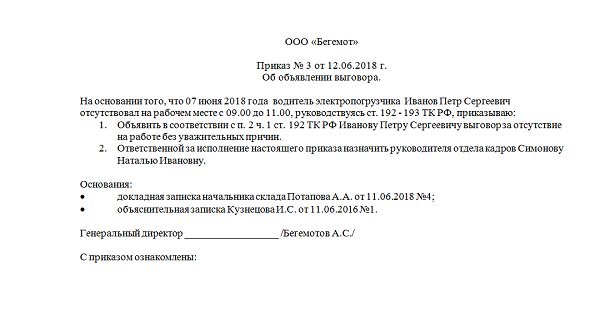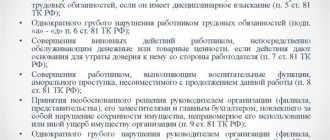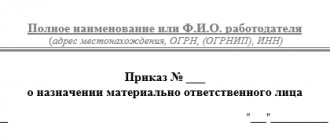Possible sanctions for dismissal
In some cases, being a couple of minutes late can have serious consequences.
Lateness is considered a minor violation, but disciplinary liability is provided for it.
At the same time, it is important to know that the Labor Code of the Russian Federation specifies only the following options for penalties: reprimand, reprimand, severe reprimand, dismissal. At the same time, the Labor Code does not allow any fines or deductions from an employee’s salary for missed minutes: any change in salary is a deviation from the terms of the contract, therefore, according to the law, it is unacceptable
However, many companies have found a way out of this situation: the majority of their salaries are bonuses, the size of which can be easily changed at the request of management. In such organizations, the most common sanction for lateness or absenteeism is deprivation of the bonus in whole or in part, for example 30 or 50%. Since it is not regulated by an agreement, the company’s management acts within the framework of the law.
Another important condition: for one offense, an employee can be punished only once. If it comes to a conflict with management, the most serious thing that awaits the employee upon the first offense is one severe reprimand entered into his personal file
There are no additional fines or other sanctions.
More serious punishment is imposed for repeated violations of labor discipline. If an employee is late several times for unexcusable reasons, he may be fired for failure to perform duties; an entry will be made in the work book that prevents further employment.
Can I be fined for being late?
Financial punishment for being late is the most effective way to teach careless workers to follow the daily routine. But the concept of “fines” is not provided for in the Labor Code of the Russian Federation. To properly punish a violator, it is necessary to take into account the following features:
- cutting the salary or rate without reducing the hours worked is not allowed;
- You can reduce part of the additional salary in the form of bonuses;
- The company must have a local Regulation allowing the amount of additional salary to be reduced. In essence, this is non-payment for hours not worked, or a fact of violation.
Thus, in order to apply this type of punishment in practice, it is necessary to correctly document the procedure with local documents. Their contents are necessarily brought to the attention of those involved.
Remember, you can “fine” it by reducing the additional salary that the employee must earn. This norm should not apply to the guaranteed amount in the form of salary (tariff rate).
An example of writing an order to issue a reprimand
Filling out the document header
At the very beginning of the document, usually on the right or left (it doesn’t matter), the name of the company is written indicating its organizational and legal status (i.e. CJSC, OJSC, Individual Entrepreneur, LLC)
Then the word “Order” is entered, its number is entered in accordance with the document flow within the company, and the date of its creation is indicated. Next, two or three words indicate the meaning of the document.
Filling out the body of the document
This is followed by the information part of the order. This includes detailed information about the violation and the reason for the penalty (in other words, the essence of the claim against the employee is described). The date of the offense, surname, patronymic name, employee and a link to the law regulating the employer’s actions in such situations must be noted here.
Further, after the word “I order”, a corresponding order is entered to issue a reprimand and a person responsible for its execution is appointed (usually this is the immediate supervisor of the offender or the head of the personnel department - here you must indicate his position, last name, first name, patronymic). Below are links to the documents that became the basis for the order (memorandum, act, explanatory note, etc.).
Signatures of interested parties
Finally, the order must be certified by the signatures of all interested officials, including the head of the company, the head of the structural department and the offending employee himself.
Is it possible to announce due to late arrival to work?
There are several types of disciplinary action. These are:
- comment;
- rebuke;
- dismissal.
The main difference between each of them is the degree of severity.
When choosing a specific type of punishment, the employer is guided by the individual characteristics of the situation under consideration. Can I be fined for being late for work?
It is also necessary to pay attention to some nuances.
Being late is not a gross violation of production discipline.
Upon initial registration of the fact of an employee’s late attendance at work, the company’s management has the right to reprimand him.
This is the “softest” measure to suppress violations, which can be stated both orally and in writing.
A violator can be reprimanded for being late only if the offense is systematic—delays have been noticed more than once.
In addition, the repeated commission of the offense must be carried out during the period of validity of the previous one. The standard period in this case is 12 months.
Documenting
The procedure for issuing a reprimand involves the preparation of related documentation. Each paper must be drawn up correctly, without errors. No adjustments are allowed.
- Act of being late.
Writing it is the first stage of holding an employee accountable. The document should be drawn up by specialists whose responsibilities include the execution of such acts. It is important to indicate the date and time of the delay.
When drawing up the paper, there must be witnesses present who can confirm the fact that the employee did not show up for work on time. The document must be signed by the offender himself. If this action is refused, a corresponding act is drawn up.
.
- Memorandum.
The content is quite similar to the previous document. In most cases, it is drawn up by the violator’s immediate supervisor.
Its peculiarity is that the report must be drawn up in the presence of a specially assembled commission, the minimum number of members of which is 3.
- Explanatory letter.
Its registration must be carried out by the late worker. To provide it, the employer must send him a demand or state the request verbally. You have 2 days to write an explanatory note.
By issuing a note, an employee can avoid punishment if it is proven that the offense was committed for a good reason.
If a citizen has documentary evidence of such a reason, it must be attached to the explanatory note.
After receiving the above papers, the employer conducts an investigation, during which the presence or absence of guilt of the late employee is determined.
If it is proven that the offense was committed for an unjustifiable reason, the offender will be held accountable. The basis for punishment is an order issued by the employer.
Examples of the text of an explanatory note about being late.
Sample order
The lateness of this sample is drawn up in any form, because a unified form for its preparation has not been developed. It is permissible to use the form provided for drawing up such documentation within the company.
The order can be issued in printed or written form. The paper is drawn up in one copy.
The header of the document contains information about the employer - the name of the company, its organizational and legal status. A serial number corresponding to the document flow is assigned. The name of the order is written in the middle of the next line.
The information part of the order displays detailed information about the offense committed. The reason for the reprimand was repeated tardiness.
Information about the violator is also indicated:
- FULL NAME;
- name of the structural unit in which the employee works;
- position held.
The order must contain a reference to the normative act in accordance with which the citizen is reprimanded. The order establishes the person responsible for the implementation of these instructions.
The documents on the basis of which the investigation was carried out are listed - acts, notes and explanatory notes. At the end of the order, the manager puts his personal signature and the date the order comes into force.
order to reprimand for being late for work - word.

Useful video
What type of disciplinary sanction can be applied to an employee for being late and whether a bonus can be deprived is described in detail in this video:
What disciplinary violation can be applied for being late or absenteeism?
Violation of labor regulations and discipline is not permitted. When being hired, an employee signs documents upon familiarization that establish the rules of conduct and work schedule (in any case, this is required by labor legislation, but some employers neglect this). They sign and the employee undertakes to comply with the work schedule, be at the workplace at the appointed time, and come to work on time.
If violations nevertheless occur, the manager decides how to punish the employee. The law stipulates three types of penalties, but no explanation is given as to which type of penalty should be applied for which offense. Therefore, the employer decides this issue independently on the basis of the received documentation indicating a violation of labor discipline (absenteeism or tardiness). The employee’s explanations, the circumstances of the incident, possible consequences in the form of material damage or harm to health, and the frequency of repetition of such a violation are taken into account.
In practice this is usually done.
Being late once is not punished in any way, but a verbal warning is given. Repeated tardiness may be punished with a written reprimand. Repeated, frequent tardiness may result in a reprimand.
If lateness develops into absenteeism, then you can even be fired or reprimanded for one absence.
In any case, before preparing an order to impose a disciplinary sanction for being late or absenteeism, you need to collect evidence that will confirm the employee’s guilt and be sure to listen to the offender. The degree of respectability of the reason given by the employee in his justification is determined by the manager independently.
It is impossible to punish deprivation of salary, bonus or other payment if there is no corresponding act that prescribes such fines.
Documenting the imposition of a disciplinary sanction
The fact of violation is recorded in an act - an act of absence from work.
The head of the unit writes a memo - a sample memo about absenteeism.
The employee writes an explanatory note - a sample explanatory note about being late or absenteeism.
Upon review of the above and additional documents, the manager makes a decision on possible disciplinary punishment. If the decision is positive, an order is drawn up. If a reprimand is announced and entered into the work book, then the entry is made on the basis of the order. If an employee quits, then the standard procedure for terminating the employment contract without working off is carried out at the initiative of the employer.
Term of punishment
A violator can be punished for being late for work only within a certain period of time. The legislator outlined several key positions related to deadlines. These should be kept in mind until the collection order is signed.

The classic period for punishment is one month from the date of violation. This period is valid in all cases if the violator of discipline was regularly at work for the entire period after the date of delay. In this case, issuing an order at the end of the month will be illegal. Calculated from the date of discovery.
When, after being late, the employee got sick, went on vacation, or went on a business trip. Here, the deadlines are extended for the entire period of absence, but cannot exceed six months. But this does not mean that the employer has an additional six months to consider the case. The violation will need to be dealt with within a month after the employee returns to work.
The fact of delay was discovered by the financial audit of the enterprise. If such a violation is associated with damage to the company, the employee can be held accountable within a period of no later than 2 years from the date of delay.
Remember, if the employer missed the deadlines described above, even if there is a violation, issuing a collection order will be unlawful.
What should an employee do if they are late?
You can explain being late and try to smooth the situation over.
Every employee has faced a situation where it is not possible to get to work on time. What needs to be done to reduce penalties to a minimum or avoid punishment altogether? Possible sequence of actions:
- It is highly advisable to notify your immediate superiors about the delay and explain the reasons. Even if they are disrespectful (overslept, got stuck in a traffic jam, etc.), management can be understanding and do without a reprimand. In any case, it is better to warn than to hope that no one will notice your absence.
- If the reason for being late is valid, it must be documented. If you felt unwell and went to the clinic, you will need a certificate from a doctor; if you were in an accident, you will need a certificate from the traffic police. If there was a utility accident at home, you will subsequently need to obtain a certificate from the housing office and present it at work as a supporting document.
- Write an explanatory note. This document is written at the request of management and gives the employee the opportunity to speak out and explain all the reasons for the misconduct. The explanatory note itself is not an exculpatory document; it must be accompanied by evidence of valid reasons.
What should you never do? Firstly, it is extremely undesirable to lie. If the relationship with your superiors is good, it is better to name the true reason for being late and promise not to allow this to happen again, rather than childishly invent non-existent circumstances. Secondly, it is better not to try to falsify doctor's certificates and other documents to justify oneself. This will not improve the situation, but will only worsen it, since management can easily verify the authenticity of any document if doubt arises.
If it turns out that an employee used a fake certificate, he will most likely be fired. In addition, criminal prosecution awaits the doctor or police officer who issued the forged document. In order not to complicate life for yourself and others, it is better to refuse unnecessary risks.
Is it legal to fine for being late?
Since lateness is regarded as a non-serious violation, the employer has the right to apply only disciplinary sanctions. However, they can also seriously complicate the life of an unpunctual employee.
According to the provisions of Art. 192 ch. 30 of labor legislation, management has the right to use the following types of punishment:
- Oral or written reprimand if a single violation is detected.
- A reprimand for repeated lateness as a type of non-material punishment.
- Severe reprimand for systematic violations.
- Termination of the employment contract, dismissal under the article, if other measures have not helped, and the employee continues to be late (at least 3 times late).
Any of the above penalties is lawful if the audit establishes the absence of valid reasons. Otherwise, absence from work will not be a reason to impact the employee and will not have negative consequences.
The legislation has rules regarding the time of application of punishment - it is legal within six months from the moment the case is identified. If the employee no longer violates discipline within 1 year, the legality of the penalty is canceled. When issuing a reprimand, the manager reserves the right to cancel it without waiting for the expiration of the 12-month period, subject to the correction of the employee.
As can be seen from the content of Art. 192 of the Labor Code of the Russian Federation, the administration of the organization does not have the right to fine an employee if he is late, or otherwise reduce wages. If an employee has been fined for being late or otherwise subject to material penalties, he has the right to protest the legality of the fines at work and bring the official to administrative punishment.
Rules for completing an order
The order is issued in a single copy
- on a regular A4 sheet
- or on the company’s letterhead (the latter option is preferable - there is no need to additionally enter the organization’s details).
You can write it either by hand or print it on a computer. But regardless of which option is chosen, the order must be certified with a “live” autograph of the head of the organization. There is no need to put a seal on it, since it relates to the internal documentation of the enterprise and, moreover, since 2016, legal entities may not use seals and stamps at all to endorse papers.
Disciplinary measures for being late for work
These include:
- remark (issued orally as a warning about the possible strengthening of existing punishments for committing certain offenses);
- reprimand (issued in the form of an order to impose such a penalty and can be withdrawn by decision of the manager at the appropriate level);
- dismissal for appropriate reasons (applied for the most serious offenses and must be formalized in the form of an order).
This list is exhaustive and cannot be adjusted directly by the employer. That is, in accordance with the current legislation, it is impossible to impose a fine as a disciplinary sanction, since this type of enforcement action does not apply to disciplinary measures. In addition, it can only be imposed by a court by its decision for committing an administrative offense or a criminal offense.
Order to issue a reprimand for being late
If you refuse to sign a document, you need to draw up an appropriate act (you should never forget that a subordinate can challenge the employer’s actions in court or complain about him to the territorial labor inspectorate).
Information about a single reprimand is not entered into the employee’s work book, but is recorded in the order of dismissal for systematic violations, if it occurs during the period of its validity.
The order form itself, completed in accordance with all the rules, after entering into force, is transferred for storage to the archive of the enterprise, where it is kept for the period established for such documents by the legislation of the Russian Federation.
Being late for work - what are the dangers and how to deal with it?
As practice shows, most often they fall on the execution of personnel department employees. However, the head of any department or service has the right to order the imposition of punishment on an employee.
Attention In any case, the executor coordinates it with interested parties, after which he submits it to the head of the institution for signature. Labor Code of the Russian Federation in the latest edition Familiarization with the document on disciplinary action rests entirely with the performer
Important As a general rule, the period for an employee to become familiar with an order is three days. How to write a disciplinary order for being late? It is a violation of discipline if an employee is late for work.
Being late is not showing up for work at a strictly established time.
To punish a late employee, you need to draw up a disciplinary order. Its form is written.
Order of reprimand for being late for work
For such situations, various disciplinary sanctions are provided. For violation of labor discipline, such as being late, it is prohibited by law to withhold money from wages, otherwise management will incur administrative punishment.
Disciplinary measures for lateness Only disciplinary sanctions are applied to a late employee, since violation of the work schedule is a disciplinary offense. There is a rule according to which the punishment should be chosen based on an assessment of the severity of the offense.
For one offense, one punishment should follow (and it must be applied within a month, maximum 6 months, not counting the employee’s time on vacation); applying several different punishments at once against an employee who has committed only one offense is unlawful on the part of the employer.
Disciplinary action for being late for work
Nowadays, it is not uncommon for company employees to abuse labor discipline by being late for work from time to time. At the same time, late arrival to the workplace often happens for no valid reason.
Sometimes such delay can cause significant losses to the company. We will tell you how you can punish a negligent employee.
Using examples, you will see which documents should be filled out and how to avoid future disputes in court. What is lateness? The concept of working hours includes not only the start and end times of work, but also the time of breaks in work.
In this case, the working time regime (common for the organization’s employees) is fixed in the internal labor regulations, and for employees whose working time regime differs from the general rules established by a given employer - in an employment contract (Art.
Art.
How to write a disciplinary order for being late?
If the employee is unable to sign the order due to absence from work, then this period is extended. If an employee does not want to confirm familiarization with the order with a signature, a report to this effect is drawn up.
Where can I order a reprimand for failure to fulfill duties? You can download a sample order for a disciplinary sanction - a reprimand - on our specialized portal.
A sample order to reprimand an employee is available here.
We announce a reprimand or reprimand
Petrov If, after two working days, the employee still does not provide an explanation for the reasons for absence from the workplace, then an appropriate report should be drawn up (see example 5). Example 5.
Limited Liability Company Autotech AKTob refusal to give explanations about the reasons for absence from work 24.03.
2011 N 2 By me, director Sergei Alekseevich Rybakov, in the presence of the head of the garage A.I.
Concept
In the Labor Code in force in the Russian Federation, there is no concept of lateness as an independent legal category.
This type of offense is characterized by a general term - violation of discipline.
Despite this, lateness is usually understood as a situation in which an employed citizen is not able to begin his work on time due to his absence from the workplace.
It is important to note that being late has a set time frame. A violation of this type can be recorded provided that the employee does not show up for work within 4 hours. If his absence lasts longer, the offense is equivalent to truancy.
Lateness can be noted not only at the beginning of the work shift. The specialist may stay late during a lunch break or after attending an organizational event.
Career
If such an explanation was not taken from the employee, the order imposing punishment is considered invalid. Based on the results of checking all the information confirming that the employee committed a disciplinary act, a report on disciplinary action for committing a disciplinary offense is drawn up, which reflects the essence of the act.
And such an act can be prepared no earlier than 2 business days after the employee provides an explanatory statement regarding the commission of an action considered a disciplinary offense.
A valid reason for being late for work
Labor law norms do not contain a list of valid reasons, and there are no criteria in the laws by which circumstances can be classified into one group or another.
There may be reasons that objectively prevent you from getting to your workplace on time, for example, a major accident on the road, a terrorist attack in the subway, a burst pipe in an apartment, or a stuck elevator. A person cannot influence any of the listed circumstances, but this can happen to anyone.
It is important to prove that this happened to you, then there will be no punishment. And if so, the order can be appealed and canceled in court
Rules for drawing up an order
As of today, there is no standard unified form for an order to issue a reprimand. Enterprises and organizations can develop its form at their own discretion and based on their own understanding of this document or use widely used templates. In any case, when creating it, you must adhere to certain standards.
In particular, this document must contain information about the employer and employee, the reason for the reprimand and links to supporting documents.
The employee in respect of whom the order is issued is obliged to familiarize himself with it and put his signature on it. If you refuse to sign a document, you need to draw up an appropriate act (you should never forget that a subordinate can challenge the employer’s actions in court or complain about him to the territorial labor inspectorate).
Information about a single reprimand is not entered into the employee’s work book, but is recorded in the order of dismissal for systematic violations, if it occurs during the period of its validity.
The order form itself, completed in accordance with all the rules, after entering into force, is transferred for storage to the archive of the enterprise, where it is kept for the period established for such documents by the legislation of the Russian Federation.
Before issuing an order
The procedure for imposing disciplinary sanctions is strictly regulated by the labor legislation of the Russian Federation. In particular, any order relating to employees of an organization, including this one, must have some written basis. In this case, their role is usually played by
- a memorandum from the head of the structural unit in which the offending employee works,
- explanatory note from the employee,
- an act establishing the discovery of a violation, etc.
If an employee refuses to provide an explanation for the misconduct that occurred, this must be recorded in a separate document.
The employer has the right to issue an order to issue a reprimand no later than a month after the fact of the offense is established (this does not take into account the employee’s illness, vacation, etc. periods of absence on legal grounds). Do not forget that for one offense the employer has the right to impose only one disciplinary punishment out of three main ones:
How to record the fact of being late
The key point of any violation is its correct recording. In case of being late for work, the following methods of recording are applicable:
- Technical means . A turnstile with an electronic pass system, a video surveillance camera with a timer at the entrance to the office, an electronic registration system on a computer - this is a popular, but not complete list of such recording. In this case, independent equipment is used to record the violation without the participation of outsiders.
- Reports of watchmen and security guards . Typically, this method of confirming a violation is relevant when, upon arrival at the company at the entrance, an employee signs in a special log (entrance to the enterprise, receipt of keys, need to remove the alarm from the premises). The employer is independently informed of deviations from the established schedule.
- Reports from immediate supervisors . These could be foremen, heads of sections, departments, or small units.
- Acts of authorized persons . In practice, this type of recording is carried out by a commission checking the availability of employees at their workplaces in the process of carrying out the orders of the head of the company. The commission should include non-interested persons, as well as a representative of the workforce.
Regardless of the method of recording the violation, it must be stated on paper. Reports, acts, certificates from the archive of technical equipment must clearly display the name of the offender, the time of entry into the office (workplace). The information must clearly indicate the fact of the violation.
Remember, without initial recording and registration of lateness, it is impossible to bring the violator to any kind of responsibility.









